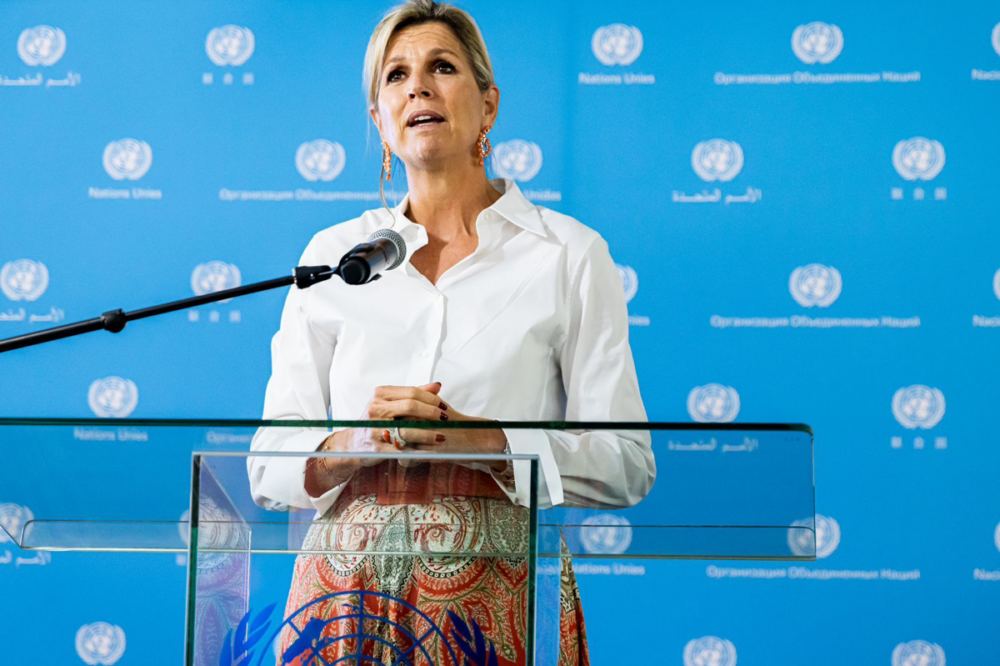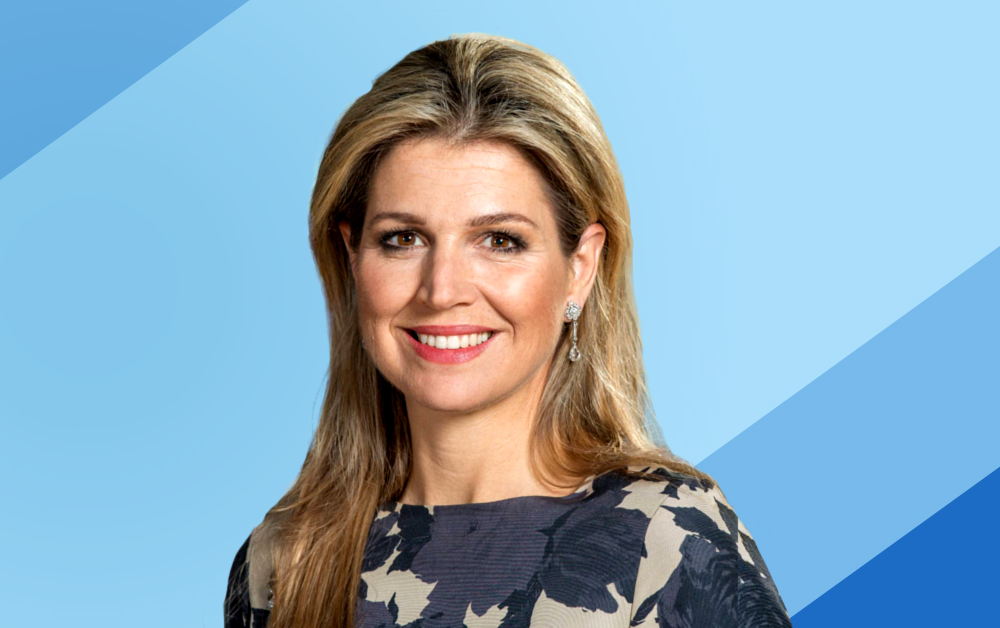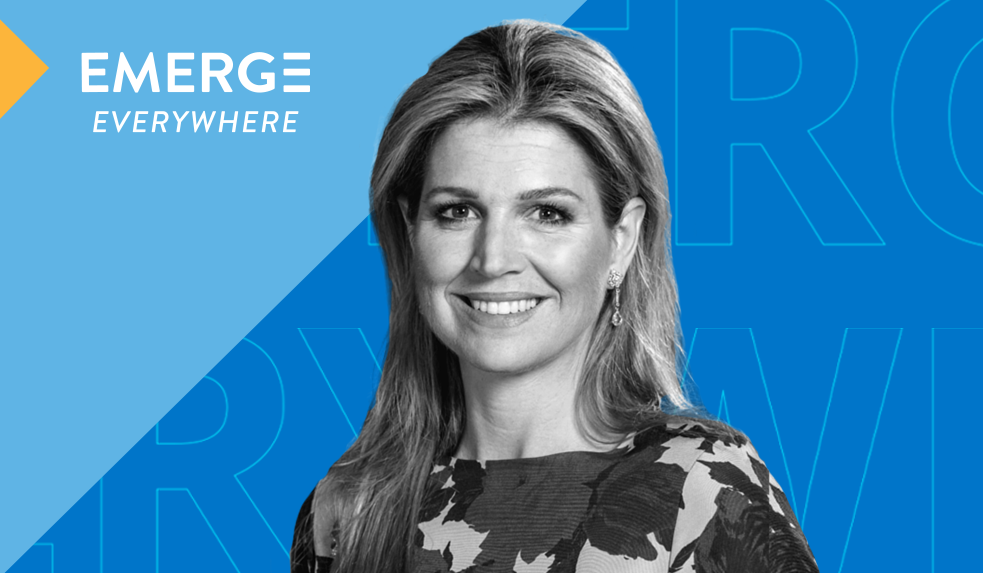Visionary Spotlight: Reflections from UN Secretary-General’s Special Advocate Queen Máxima
Our 2021 Financial Health Visionary Award honoree shares why she’s committed to financial health and key opportunities for the movement in its next chapter.
By Financial Health Network
-
Category:

Since 2009, Her Majesty Queen Máxima of the Netherlands has served as the United Nations Secretary-General’s Special Advocate for Inclusive Finance for Development (UNSGSA). As Special Advocate, she is a leading global voice on advancing access to and responsible usage of affordable, effective, and safe financial services to benefit people around the globe. One of her recent achievements is forming a financial health working group, including the Financial Health Network, that has worked with the United Nations Environment Programme Finance Initiative (UNEP FI) to establish a comprehensive framework for financial institutions to impact financial well-being and inclusion.
In 2021, Queen Máxima received the Financial Health Network’s Financial Health Visionary Award, which recognizes individuals who have demonstrated exceptional leadership in creating a more equitable financial system. As only the second recipient of the award since it was established in 2018, Queen Máxima brings a commitment to innovation and global impact to her work that made her a natural fit for the honor.
See the Next Visionary Award Honoree at EMERGE
The Financial Health Visionary Award makes its return at EMERGE Financial Health 2024, where we’ll unveil our newest honoree who has demonstrated unparalleled leadership in creating a more inclusive financial system. Be there for this special moment by getting your ticket to EMERGE today.
Queen Máxima recently spoke with the Financial Health Network about the continued progress of the financial health movement, why she’s expanded her focus from financial inclusion to financial health, and what stakeholders should be doing next to improve financial health for all.
Q: You’ve spent 15 years working to expand access to affordable and safe financial services as the United Nations Secretary-General’s Special Advocate for Inclusive Finance for Development (UNSGSA). What are the top two to three areas where you feel we’ve made the most progress during that time?
A: In the past 15 years, remarkable strides have been made in expanding access to affordable and safe financial services, reflecting the collective efforts of various stakeholders in the financial inclusion landscape. Among the numerous areas of progress, three stand out for their transformative impact.
First, the innovation and regulatory support for e-money have been pivotal. Beginning nearly two decades ago with pioneering policies by the central bank in the Philippines, the promotion of mobile money solutions like Kenya’s M-PESA has significantly broadened financial access. Today, we see over 1.6 billion registered mobile money accounts globally, facilitated by 315 live deployments, making financial transactions more accessible, faster, and cost-effective.
Second, the strategic use of third-party agents has revolutionized the way digital financial services are delivered. By allowing both banks and non-banks to leverage retail shops as access points, a vast network of service delivery has been established. This approach not only reduced costs for consumers but also fostered trust in formal financial systems, particularly in regions like Africa where mobile money agents became the gateway to financial inclusion.
Lastly, the development and implementation of National Financial Inclusion Strategies (NFISs) by over 64 countries have served as a cornerstone for coordinated action toward inclusion goals. These strategies, often led by central banks, have enabled countries to prioritize and sequence policies effectively, leading to many surpassing their initial targets. The evolution and renewal of these strategies signify a deepened commitment to not just enhancing access, but also ensuring the active use of financial services. Together, these advancements underscore the transformative journey toward inclusive finance, paving the way for more equitable economic participation and resilience across global communities.
Q: Several years ago, you created a financial health working group. Why have you dedicated your energy to advancing financial health? What are the biggest factors influencing financial health today?
A: The establishment of the financial health working group was a strategic move to address the nuanced challenges of financial well-being that mere access to financial services does not solve. Financial health is a multi-dimensional concept requiring individuals to not only manage daily expenses and plan for the future, but to also cope with unexpected financial shocks. While access and usage of financial services are fundamental, they are not exhaustive measures of financial health.
Over the last decade and a half, despite great progress in financial inclusion, many individuals have not seen their financial conditions improve correspondingly. The realities of economic shocks, such as the COVID-19 pandemic and inflation, have underscored the insufficiency of financial access alone in ensuring financial stability.
For instance, even though there has been a rise in account ownership in countries like Kenya, a significant proportion of the population still depends on informal financial mechanisms. In South Africa, the worry over household debt looms large despite high account penetration. Similarly, in Brazil, a considerable number of people spend beyond their means, with many grappling with debt.
These challenges are compounded by the advent of digital credit, which, while increasing income and asset ownership, has also introduced new risks due to a lack of stringent responsible lending practices. This has resulted in increased debt burdens for many, further deteriorating financial health.
Additionally, despite the strides made in digital financial services, there remains a persistent gap in addressing inequalities such as gender disparities and the financial exclusion of vital segments like smallholder farmers and small enterprises.
These observations affirm that our dedicated energy toward advancing financial health is critical. The biggest factors influencing financial health today are economic resilience, the capacity to navigate financial shocks, and the inclusivity of financial growth. To ensure a meaningful improvement in financial health, it is essential to develop products that foster savings and investment for the future and to create guardrails for responsible credit use. This approach will help bridge the divide and bring us closer to our goal of holistic financial health for all.
Q: What has the financial health working group accomplished so far?
A: The working group collaborated to reach a consensus on the definition of financial health and created a foundational guidance for policymakers on understanding and measuring financial health. Additionally, it also produced supplemental introductory information on the business case of financial health for financial services providers.
As we move forward, informed by the working group’s findings and broader dialogues, we reaffirm our dedication to advocating for financial health. The goal is not only to advance inclusion, but to also ensure that financial services tangibly contribute to improving people’s financial stability and overall quality of life. This mission emphasizes the critical importance of financial health as a cornerstone of our ongoing efforts toward inclusive economic development.
Q: You’ve been a leading advocate for collaboration between the public and private sector to improve people’s financial lives. Where should policymakers, businesses, and other stakeholders be focusing their efforts to improve financial health for all?
A: Collaboration between public and private sectors is crucial to enhancing the financial health of individuals globally. Policymakers, businesses, and other stakeholders should concentrate their efforts in the following key areas to improve financial health for all.
Firstly, establishing comprehensive data at the country level is essential. This involves collecting and analyzing information on both demand and supply aspects of financial services. For example, the financial health module in Kenya’s 2023 financial access survey and the Brazilian central bank’s 2022 Financial Health Index survey are benchmarks in this area. A standardized methodology to measure and track the financial health of adults internationally will be a pivotal step. This uniformity will serve as the backbone for global efforts to define, monitor, and enhance financial health.
Secondly, there should be a concerted push for research and the development of evidence highlighting the impact of financial health. Working with organizations like the International Monetary Fund (IMF) and the World Bank to expand the knowledge base is critical. This research should elucidate the macro-financial implications of financial health, including its connection to overall financial stability and the adaptive capacity of households to climate change.
Lastly, engaging with financial services providers and investors to champion and implement the necessary shifts supporting financial health is vital. It’s particularly important to cultivate long-term business models that are both economically viable and conducive to consumer financial wellness. Investors should consider financial health outcomes as a key performance indicator in capital allocation decisions. Financial service providers must also innovate their product offerings to align more closely with the financial health needs of their customers.
By focusing on these strategic areas, we can foster a more inclusive financial system that not only extends access but also fortifies the financial resilience and prosperity of people worldwide. This holistic approach to financial health is paramount to achieving equitable and sustainable economic growth.
Q: You were the 2021 recipient of the Financial Health Visionary Award, which recognizes individuals who have demonstrated exceptional leadership in creating a more equitable financial system. What does receiving this award mean to you?
A: The Financial Health Visionary Award was a lovely milestone. In essence, the award is less about individual acknowledgment and more a celebration of the united strides taken toward financial inclusion for better financial health. It can also be considered a call to action, spurring us on to intensify our work and continue to champion the creation of a financial environment where equity is not just aspired to but achieved.
More to Explore
Our 2021 Visionary Award: The Role of Leadership in Global FinHealth
Joined by our inaugural recipient Dan Schulman, President and CEO, PayPal, Jennifer Tescher, President and CEO, Financial Health Network, and the 2021 honoree, Her Majesty Queen Máxima of the Netherlands, United Nations Secretary-General’s Special Advocate for Inclusive Finance for Development, the discussion will include opportunities to ask questions about the role of leadership in advancing the mission and vision of financial health on a global scale.
H.M. Queen Máxima of the Netherlands: Building a Financially Inclusive World
Her Majesty Queen Máxima of the Netherlands’ passion for financial inclusion began as a child in Argentina, navigating the impacts of hyperinflation on families and desire to act. In her role as the United Nations Secretary-General's Special Advocate for Inclusive Finance for Development (UNSGSA), she champions access to affordable and safe financial services for communities around the world, especially underserved groups. Through close collaboration with public and private sector partners, her work has driven real progress for financial health. In this episode of EMERGE Everywhere, learn more about Queen Máxima’s experiences, accomplishments, and vision for the future of financial inclusion and financial health.

